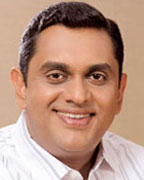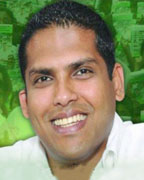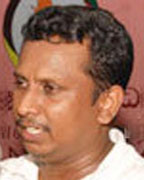Tussle for Uva Provincial Council
By Jaliya Wijekoon
The Provincial Council System was introduced under the 13th Amendment
to the Constitution in 1987 during former President J.R. Jayewardene's
regime with the signing of Indo-Lanka Peace Accord as a solution to the
long drawn out problem of Northern and Eastern people of the country.
 |
|
Sasheendra Rajapaksa |
However, the desired results were not achieved by the first
North-East PC which had only a short life span and functioned under the
Chief Minister Vartharaja Perumal who later went against the Central
Government and finally it was dissolved by President R. Premadasa.
The Sri Lanka Freedom Party (SLFP) and Janatha Vimukthi Peramuna (JVP)
vehemently opposed the PC system when it was first introduced and even
refrained from contesting the election in 1988.
As the main opposition SLFP and JVP didn't contest the election at
that time, it was virtually a one horse race for the UNP to capture
power in all Provincial Councils at the first ever PC elections held in
1988. According to the Provincial Council Act of 1987 a substantial
amount of administrative powers were devolved to the Councils and the
perks and privileges enjoyed by the councillors were also quite
equivalent to that of parliamentarians.
Second PC elections
All political parties began to actively involve in the Provincial
Council elections to capture power for their parties. After completing
the stipulated period of 5 years all PC elections were held except North
and East and UNP managed to retain the power in all councils though not
with a bigger majority at the first instance. Thereafter, the Provincial
Council system got deeply rooted in the political fabric of the country.
Uva Province was a UNP bastion at that time and the Provincial
Council was headed by a party stalwart Percy Samaraweera. The Chief
Minister Percy Samaraweera had rendered a yeoman service to the Uva
Province in respect of agriculture, education, healthcare, irrigation
and plantation. The gradual deterioration of the ruling UNP's popularity
in the Uva Province began with the demise of Percy Samaraweera whilst
the national political fabric of the country had already been
consolidated under the leadership of Chandrika Kumaratunge.
Third PC elections
 |
|
Harin Fernando |
The third Provincial Council election was held in April 1999 and
ruling UNP lost power in all provinces. Notably the UNP lost power in
Uva Province marginally when compared to other Provincial Councils in
the country. The UNP polled 137,437 and registered a 43.78 percentage
while PA polled 140,293 obtaining 44.69%. JVP polled 19,224 with a
percentage of 6.12 in Badulla district. Moneragala District also
suffered a similar defeat in 1999. In Moneragala District UNP polled
65,870 and registered a percentage of 44.31 while PA polled 66,870 with
a percentage of 45.35. JVP polled 10,292 and secured a percentage of
6.98. With the final result of both districts in Uva Province and with
two bonus seats PA managed to form the administration in Uva Province.
Samaraweera Weerawanni, a parliamentarian at the time was appointed
Chief Minister by President Chandrika Kumaratunge for which the legal
action was initiated by some councillors with no avail.
It should be noted that provincial development activities were
carried out by the council under Chief Minister Weerawanni amidst
unending problems from his own party people for reasons best known to
themselves. Then Weerawanni resigned from CM post and joined UNP, his
previous party and Chandrika appointed A.M. Buddhadasa the Chief
Minister.
The council was prematurely dissolved and was under a special
commissioner for well over six months.The 4th Uva Provincial Council was
held on 10th July 2004 in which time the JVP had joined the government
to form UPFA. UPFA recorded an easy victory in Badulla District in 2004
polling 169,197 and registering a percentage of 55.48 while UNP polled
119,171 securing only 39.08 percentage.The performances of the UNP at
Moneragala district in 2004 was still worse and polled only 48,930 votes
recording a poor percentage of only 33.12 while the UPFA recorded a
percentage of 66.24 polling 97,878 votes.
Fifth PC elections
 |
|
Samantha Vidyarathne |
UPFA mustered a clear majority in the Uva Province in 2004 and Vijith
Wijeyamuni Soysa was appointed Chief Minister by the President Chandrika
Kumaratunge.
The fifth Uva Provincial Council election was held on 8th August 2009
and the JVP has deserted UPFA by that time over some policy matters.
UPFA government was extremely popular at the time with the eradication
of terrorism which had been a cancer to the nation for almost thirty
years.
UPFA fielded Sasheendra Rajapaksa as CM candidate and he was backed
by all party stalwarts in both districts at the election.
The main Opposition UNP was riddled with a number of internal
problems at the time and the party was reduced to an abysmal level at
the Uva PC election in 2009.
In Badulla district UPFA polled a staggering 259,069 votes recording
an unprecedented percentage of 67.79 while the UNP polled only 98,635
votes reducing its percentage to a mere 25.81.
In Moneragala district the UNP's performance is even more pathetic as
the party had polled only 30,509 votes with a percentage of 15.52 while
the ruling UPFA polled a massive 159,837 votes registering a record
percentage of 81.32. JVP was marginalised with only 2.87% in Moneragala
District without a single member being elected.
UPFA secured 25 seats in the council while UNP obtained only 7 seats
with one each for JVP and Upcountry Peoples Front. Large-scale
development activities had been carried out in the province under the
leadership of CM Sasheendra Rajapaksa during the last 5 years.
Uva Provincial Council has completed its current period and the
election is scheduled to be held on September 20.
Ruling UPFA, main opposition UNP, JVP, DP, Upcountry Peoples Front
and quite a few other registered parties and some independent groups are
aggressively involved in the fray to capture power in the province on
September 20.
Unlike the previous PC elections this time it is extremely important
for both major parties as this is going to be the last PC election prior
to Presidential election scheduled to be held early next year.
All major parties believe that the results of this Uva PC election
will have a great impact on the results of the next National election.
Uva PC election will be a dress rehearsal for the big contest.
NFF contest the Uva PC elections with the government in one district
and on its own in the other district for reasons best known to
themselves. Political violence among some groups has already erupted in
some areas and it is quite clear that the things will be even worse in
the run up to the election.
All political parties have agreed with the Elections Commissioner on
the need to conduct the campaign following the accepted ethics although
there are negative incidents taking place.Political analysts believe
that the fame and good fortune in politics is rather fickle and whoever
who manages to convince the masses with the future program of work would
emerge victorious on September 20. |

